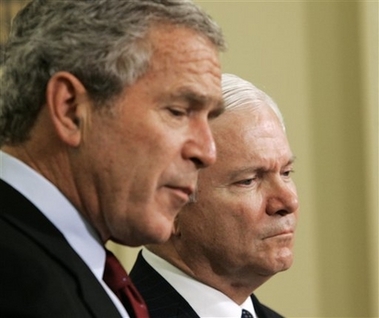Gates inherits challenges at Pentagon
(AP)Updated: 2006-11-10 10:12
WASHINGTON - President Bush's choice to head the Pentagon will inherit an unpopular war in Iraq, a straining military mobilized in hot spots around the world and a budget that commanders complain has underfunded their combat needs.
Robert Gates' biggest hurdle will doubtless be meeting the high expectations for an Iraq exit strategy under pressure from next year's Democratic-controlled Congress and a war-weary American public.
|
|
"If anybody had a silver bullet answer for this, the president and the previous secretary would have done it, they would have loved to get the troops out early," said retired Marine Lt. Gen. Michael DeLong, former deputy commander of the US Central Command during the Afghanistan and Iraq wars.
As a member of the Iraq Study Group, a bipartisan panel that has been asked to help chart a new course in the war, Gates has been immersed in the issue for months. That group is expected to issue its recommendations as early as next month, and they are eagerly awaited by Bush and members of Congress.
Some military leaders have quietly suggested there are ways to reduce the number of US troops in Iraq by restructuring the way coalition forces are being used.
A smaller US presence, they have argued, could lessen tensions and reduce the violence and still provide needed training to the Iraqis. Gates will also have to decide whether to reduce the combat role of American forces there and instead use them more as advisers and as backups in emergencies.
Sen. Carl Levin, D-Mich., said he plans to ask Gates what he thinks about Democrats' proposal to begin bringing home some troops immediately to try to pressure the Iraqi government to take more responsibility.
"There's a lot of other questions that need to be asked about Iraq, having to do with the militias, having to do with the military situation in Iraq, having to do with the control of Anbar Province," an area plagued by insurgents, Levin said.
| 1 | 2 |  |
|
||
|
||
|
|

